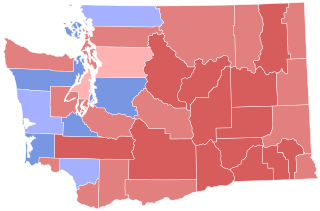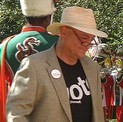
The Australian Democrats is a centrist political party in Australia. Founded in 1977 from a merger of the Australia Party and the New Liberal Movement, both of which were descended from Liberal Party dissenting splinter groups, it was Australia's largest minor party from its formation in 1977 through to 2004 and frequently held the balance of power in the Senate during that time.
The Green Party of the United States (GPUS) is a federation of Green state political parties in the United States. The party promotes green politics, specifically environmentalism; nonviolence; social justice; participatory democracy, grassroots democracy; anti-war; anti-racism, anti-capitalism, libertarian socialism and eco-socialism. On the political spectrum, the party is generally seen as left-wing.

The 2004 Washington gubernatorial election was held on November 2, 2004. The race gained national attention for its legal twists and extremely close finish, among the closest political races in United States election history. Republican Dino Rossi was declared the winner in the initial automated count and again in a subsequent automated recount, but after a second recount done by hand, Democrat Christine Gregoire took the lead by a margin of 129 votes.
Electronic voting is voting that uses electronic means to either aid or take care of casting and counting ballots.

The Help America Vote Act of 2002, or HAVA, is a United States federal law which passed in the House 357-48 and 92-2 in the Senate and was signed into law by President Bush on October 29, 2002. The bill was drafted in reaction to the controversy surrounding the 2000 U.S. presidential election, when almost two million ballots were disqualified because they registered multiple votes or none when run through vote-counting machines.
Britain J. Williams III is a Professor Emeritus of computer science at Kennesaw State University in Georgia, and is consultant with the school's Center For Election Systems. He has bachelor's and master's degrees in mathematics from the University of Georgia, and a PhD is in Statistics from the University of Georgia in 1965. He joined the faculty of (then) Kennesaw State College in 1990.

The Election Assistance Commission (EAC) is an independent agency of the United States government created by the Help America Vote Act of 2002 (HAVA). The Commission serves as a national clearinghouse and resource of information regarding election administration. It is charged with administering payments to states and developing guidance to meet HAVA requirements, adopting voluntary voting system guidelines, and accrediting voting system test laboratories and certifying voting equipment. It is also charged with developing and maintaining a national mail voter registration form.

Elections in the United States are held for government officials at the federal, state, and local levels. At the federal level, the nation's head of state, the president, is elected indirectly by the people of each state, through an Electoral College. Today, these electors almost always vote with the popular vote of their state. All members of the federal legislature, the Congress, are directly elected by the people of each state. There are many elected offices at state level, each state having at least an elective governor and legislature. There are also elected offices at the local level, in counties, cities, towns, townships, boroughs, and villages; as well as for special districts and school districts which may transcend county and municipal boundaries. According to a study by political scientist Jennifer Lawless, there were 519,682 elected officials in the United States as of 2012.
An absentee ballot is a vote cast by someone who is unable or unwilling to attend the official polling station to which the voter is normally allocated. Methods include voting at a different location, postal voting, proxy voting and online voting. Increasing the ease of access to absentee ballots is seen by many as one way to improve voter turnout through convenience voting, though some countries require that a valid reason, such as infirmity or travel, be given before a voter can participate in an absentee ballot. Early voting overlaps with absentee voting. Early voting includes votes cast before the official election day(s), by mail, online or in-person at voting centers which are open for the purpose. Some places call early in-person voting a form of "absentee" voting, since voters are absent from the polling place on election day.

Election Systems & Software (ES&S) is an Omaha, Nebraska-based company that manufactures and sells voting machine equipment and services. The company's offerings include vote tabulators, direct-recording electronic (DRE) machines, voter registration and election management systems, ballot-marking devices, electronic poll books, Ballot on Demand printing services, and absentee voting-by-mail services.
Ita or ITA may refer to :

Raymond Jon Tester is an American farmer and politician serving as the senior United States senator from Montana, a seat he has held since 2007. He was first elected in 2006, defeating Republican incumbent Conrad Burns in one of the closest Senate races of that year. He narrowly won reelection in 2012 against U.S. Representative Denny Rehberg, and in 2018 against Montana State Auditor Matt Rosendale. Tester was previously the president of the Montana Senate and worked as a music teacher and farmer. He became Montana's senior senator in 2014 following Max Baucus's departure and is the dean of Montana's congressional delegation. Since January 4, 2021, he has been the only member of the Democratic Party to hold statewide office in Montana.
Various governments require a certification of voting machines.

Ion Voltaire Sancho was an elected public official who served Leon County, Florida, as Supervisor of Elections for 28 years, from 1989 to 2017. During his time in office, he was admired for his integrity as a voter advocate and elections expert, and became nationally known for his role in the Florida presidential election recount of 2000 and his appearance in the 2006 investigative documentary Hacking Democracy.
R. Doug Lewis has served as Executive Director of the Election Center since 1994. The Election Center is a nonprofit also known as the National Association of Election Officials, whose purpose is "to promote, preserve, and improve democracy."
An Independent Testing Authority (ITA) is a laboratory certified by the United States-based National Association of State Election Directors (NASED) to test voting systems to the Voting System Standards (VSS) or the Voluntary Voting System Guidelines (VVSG) in the process of certifying voting systems. The Election Assistance Commission has taken over the responsibility for accrediting such laboratories and now uses the National Institute of Standards and Technology's National Voluntary Laboratory Accreditation Program. Under the EAC process, ITA's are now known as Voting System Testing Laboratories (VSTLs).
The Voluntary Voting System Guidelines (VVSG) are guidelines adopted by the United States Election Assistance Commission (EAC) for the certification of voting systems. The National Institute of Standards and Technology's Technical Guidelines Development Committee drafts the VVSG and gives them to the EAC in draft form for their adoption.

An election audit is any review conducted after polls close for the purpose of determining whether the votes were counted accurately or whether proper procedures were followed, or both.

The 2020 United States presidential election in Alaska took place on Tuesday, November 3, 2020, as part of the 2020 United States presidential election in which all 50 states and the District of Columbia participated. Alaska voters chose three electors to represent them in the Electoral College via a popular vote pitting incumbent Republican President Donald Trump and his running mate, incumbent Vice President Mike Pence, against Democratic challenger and former Vice President Joe Biden and his running mate, United States Senator Kamala Harris of California. The Libertarian, Green, Constitution, and Alliance Party nominees were also on the ballot, as was an Independent candidate. Write-in candidates were required to file a declaration of intent with the Alaska Division of Elections at least five days before the election, and their results were not individually counted.

Electronic voting in the United States involves several types of machines: touch screens for voters to mark choices, scanners to read paper ballots, scanners to verify signatures on envelopes of absentee ballots, and web servers to display tallies to the public. Aside from voting, there are also computer systems to maintain voter registrations and display these electoral rolls to polling place staff.










